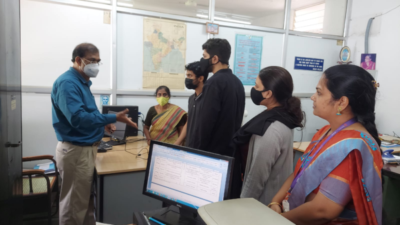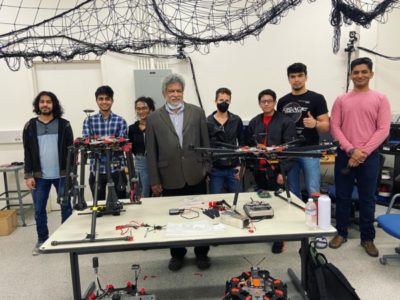By Amanda Weissman
The ideal successful engineering professional should not only depend on their learned technical skills but should embody professional skills which cannot be taught in a classroom, only developed in the real world.
EPICS in IEEE provides students with a hands-on opportunity to use their technical skills to solve a real community problem, all while developing needed professional skills throughout their experience. The program was created to provide students with real-world engineering experience and a place to learn, make mistakes, and even try something new.
“It’s an opportunity to do things in different ways than more structured experiences, such as courses and activities,” says Leah Jamieson, one of the founders of EPICS. “It’s really about growing as a professional and growing as a person.”
Engineering a solution in the real world creates a sense of career readiness. Students will improve and further develop their communication, leadership, teamwork, and customer awareness skills, which sets them apart from other students.
Project Management Skills
EPICS in IEEE projects instill newfound confidence in students. By allowing the student team to take full initiative in every step of the project, they will learn about all of the logistics that go into managing a project.
The initial project proposal requires the team of students to state the problem and proposed solution, and plan out what resources, materials, and funding they might need. This planning process is very important as it shows the students how to stay on task, especially in new areas, such as budgeting.
“We want them to learn about budgeting because it’s an important professional skill,” Jamieson says. “We try to be flexible in the proposal structure to encourage students to think about the project in terms of incremental milestones, with checkpoints to gauge progress. At the same time, we want them to know that they can come back to EPICS in IEEE and make the case for changes to the project, including the budget. It’s part of the learning experience.”
One team, focused on building an assistive head mounted device for the blind, ran into an issue with one of the parts they had ordered. Because of their planning process, they still had funds available to order the correct part, which emphasized the importance of keeping track of a budget.
In their future careers, there will be times they’ll have to direct and oversee a project, and this early exposure can confidently set them up for success.
Problem Solving Skills
It’s okay to not know how to solve a never before seen problem, but it’s important to know how to approach it. In these community projects, certain problems will arise and with the help of EPICS in IEEE, students will build a tool kit to assist them in navigating those types of problems.
There will be parts that students have never worked with before, and although it might cause initial frustration, it ultimately becomes a strength. Not only will students become comfortable with solving unfamiliar problems, but they will also learn different methods to approach unknown problems.
“I learned that most problems have been faced by at least one person before you,” says Tejas MR, a member of the student team helping the blind community. The team was comfortable with the hardware portion of their device, but the software was something quite new to them and they realized they needed help. By sticking with his new learned approach, the team chose to use open-source software, which is essentially a giant worldwide collaboration, to assist them.
Learning to utilize an extensive network of resources is extremely important, which is why EPICS in IEEE offers assistance from professionals, advisors, and former EPICS students. Students learn the importance of being okay with asking for help, and later in their careers, there is nothing wrong with doing the same thing.
Customer Awareness
Partaking in a community project teaches students the importance of solving with a community–not just for one.
 “Putting yourself in the shoes of that community, or community organization is exercising something that is not often part of an engineering education experience,” Jamieson says.
“Putting yourself in the shoes of that community, or community organization is exercising something that is not often part of an engineering education experience,” Jamieson says.
EPICS in IEEE requires students to connect with NGOs’ to develop their project’s mission and gain a clearer insight into their target community. Being in constant communication with both the community and the NGO teaches students how to work with the desired users to ensure their solution meets their needs.
“Merely engaging, talking, and working with the National Association for the Blind helped us look at problems from a different angle,” Tejas says. This student team has learned a new sense of empathy, which is a skill that is increasingly higher in demand, and one that cannot be learned without real-world experience.
“It will add a richness to your job,” Jamieson says. There is a difference between being an engineer who is good at solving problems, and being an engineer who brings empathy to the understanding of potential users. EPICS in IEEE instills a sense of empathy, which will be of good use in their careers as they continue to solve problems for a community.
Communication Skills
“If you look at what’s happening in engineering today, one person is not creating a single thing,” Jamieson says. “It’s a team sport.”
Students will experience the dynamic of working with a group of individuals to solve one problem, which will develop their collaboration skills. Working with a diverse team of students will not only allow them to showcase their individual skills, but also allow them to learn more. 
“Working with a diverse team is really beneficial because everyone is bringing in their different perspectives, it’s been constrictive and informative,” says Preyasi Shah, Co-manager of Project DIANA. Her team was composed of computer science, robotics, and engineering students, which added a different dimension to the planning and design phases of the project.
Students are able to try new things, which is unlike school projects that assign each student a role. One student from Project DIANA, Maia Medeiros, volunteered to fly the industrialized size drone despite having never controlled one before. Being a part of this project allowed her to step outside of her comfort zone because she had the opportunity to try something new.
Without communication, there would be no collaboration, and therefore no progress on the project. By learning these skills, engineering students will be confident enough to speak up, share their thoughts, and volunteer themselves to try something new.
A New Network
EPICS in IEEE provides students with a lifelong, extensive network of professional and academic individuals. Having access to IEEE professionals and professors from all over the world teaches students how to create and foster a network of helpful, lifelong relationships.
“We were able to meet so many different scientists, professors, and other students. We have more potential for change,” Shah says. An extensive network is extremely important in the real world, and EPICS in IEEE students get a head start in building one of their own that they will continue to use throughout their careers.
EPICS in IEEE gives students the platform to improve and learn new skills, and create meaningful relationships to excel them in their future careers. Among all, it proves to the students that they can make a difference.

Recent Comments